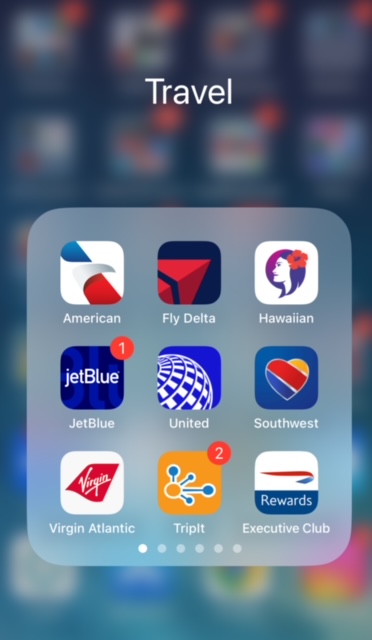Best AI Travel Apps [2024]
Are you tired of spending countless hours researching and planning your next trip? Imagine having a virtual travel personal assistant at your fingertips, ready to provide personalized recommendations and insights to enhance your travel experience. In this article, we explore the transformative power of artificial intelligence in the world of travel planning. From predicting trends to recommending the best destinations, AI is revolutionizing how we make smarter travel choices. Join us as we delve into the rise of AI in travel, highlight the best AI-powered apps for travelers, and discover how you can unleash the power of AI to streamline your travel planning process. Get ready to embark on a journey towards smarter and more efficient travel decisions with the help of AI technology.

First, a little Background About Artificial Intelligence (AI)
There are many types of Artificial Intelligence. However, Narrow AI is the only type of AI that currently exists. Narrow AI is designed to perform a specific task exceptionally well, often surpassing human capabilities in that narrow domain. Examples of Narrow AI include Siri, Amazon’s Alexa, and IBM Watson. OpenAI’s ChatGPT app is another example of Narrow AI. The Microsoft Bing Co-Pilot tool is also a great example of Narrow AI.

Strong AI and Super AI are two theoretical higher forms of AI that would enable machines to gain more intelligence using deep learning and neural networks. They do not exist today, but potentially would cause AI to become more dangerous. AI image generators, such as the Android Magic Eraser, that are used today to modify images potentially also are potentially dangerous. Intellectual property theft and copyright infringement are also major concerns. Regulations will be needed to manage these risks.
Generative AI
Generative AI is a type of artificial intelligence technology that uses machine learning systems capable of generating text, images, code, or other types of content, often in response to a prompt entered by a user. ChatGPT is the most popular form of Generative AI today. It became popular early in 2023. It, or similar systems, are used for content creation to generate text for books or blog posts like this one.
Natural Language Processing
Another form of AI, Natural Language Processing (NLP) is widely used today. Also referred to as conversational AI, NLP is at the heart of systems like Siri, Google Assistant, and Alexa. By performing speech recognition, NLP systems allow us to talk directly with the computer in our native language. Not surprisingly, one of the best applications is language translation. Online translators, powered by NLP, can now handle complex sentences and entire texts. Think of how Google Translate has evolved from word-to-word translations to accurate multilingual communication. We use it extensively when we travel to countries where we interact with people whose primary language is different from ours. We can think of no better AI tool that has made the world smaller.
The Rise of AI in Travel
As AI continues to make its mark on the travel industry, one key area where its impact is particularly pronounced is in assisting DIY travelers in making informed decisions. AI has the power to revolutionize the way travelers plan their trips and make the most of their experience. In addition, AI helps DIY travelers make informed decisions by providing personalized recommendations based on their preferences and past travel behavior. By analyzing data from various sources, AI can suggest the best options for accommodations, activities, and dining based on the traveler’s interests and budget. This level of personalization allows travelers to plan their trips with confidence, knowing that they are making choices that align with their preferences.
Moreover, AI can help DIY travelers optimize their travel itineraries by considering factors such as weather conditions, traffic patterns, and popular tourist attractions. Unfortunately, most of the apps that we analyzed are still not that sophisticated. Specifically, since they are limited by the data that is available to them on the Internet they are unable to make complicated cross-data connections. However, by leveraging real-time data and machine learning algorithms, AI can suggest the most efficient routes and highlight hidden gems that might otherwise go unnoticed. This not only saves travelers time and energy but also enhances their overall travel experience.
By harnessing the power of AI, DIY travelers can access a wealth of information and insights that enable them to make smarter decisions throughout their journeys. Whether it’s finding the best local restaurants, avoiding crowds at popular tourist sites, or discovering off-the-beaten-path destinations, AI empowers travelers to make the most of their travel experiences. So, let’s explore some of the best AI-powered apps for travelers that can take their trips to the next level.
Conversational AI Apps in the Travel World
Conversational AI using NLP is the best thing today that has revolutionized the travel industry, enhancing both customer experiences and operational efficiency. By using text prompts, conversational AI is a much friendlier user experience. Of all the forms of AI, it has had the biggest impact. Let’s delve into how it’s reshaping the way we travel:
- Customer Support and Assistance:
- AI-powered chatbots provide 24/7 support to travelers, answering queries related to bookings, itineraries, and travel information.
- They’re like your digital travel assistants, always ready to assist!
- Booking and Reservations:
- Conversational AI simplifies the booking process by allowing travelers to make flight, hotel, and restaurant reservations through natural language interactions.
- Imagine booking your next adventure with a simple chat!
- Personalized Recommendations:
- AI analyzes user data to offer tailored travel recommendations. Whether it’s suggesting destinations, hotels, or activities, Conversational AI ensures a personalized touch.
- Your travel plans become uniquely yours!
- Multilingual Support:
- Chatbots bridge language barriers, assisting travelers in various languages and making travel more accessible and comfortable.
- Itinerary Management:
- AI helps organize and manage travel itineraries, including flight schedules, accommodation details, and activity bookings.
- Customer Feedback and Surveys:
- Chatbots play a pivotal role in collecting feedback from travelers, helping businesses gain insights into customer preferences and areas for improvement.
- Emergency Assistance:
- AI provides vital information during emergencies, such as natural disasters or health crises, helping travelers stay safe and informed.
- Concierge Services:
- In hotels, AI-powered virtual concierges offer guests recommendations for local attractions, dining options, and transportation.
So, whether you’re planning a solo adventure or a family vacation, Conversational AI is there to make your journey smoother, more personalized, and enjoyable.
Our Search for the Best AI Travel APPs
This post is a summary of what we have learned about the current state of AI in the travel world and how it is helping DIY Travelers like yourselves. We will briefly discuss and review many of the AI features being used in DIY travel planning tools currently on the market. Our reviews may be a little tough on some of the current apps for two primary reasons.
1. Natural Language:
First, we are looking for DIY Travel Planning Apps that use natural language processing. If you do any chatting on websites like Expedia or other travel planning websites, you are using some form of NLP. But these chatbots are not necessarily built to help you as a traveler. They are built to reduce the amount of time the company’s call center staff spend talking to you. They do this by having the chatbot provide you with simple answers to your basic questions and take in rudimentary information, such as your name, booking confirmation number, etc. When they encounter a difficult planning question, they usually will put you into a queue to talk to a call agent.
Thus, the travel apps that we have found and reviewed tend to follow more traditional selection ways of gathering the information they need to help plan your travel itinerary (i.e. they don’t use natural language processing).
2. Generalized Information:
The second problem is that the information in the form of an itinerary that the AI Apps are providing can be overly generalized. They often return straightforward information that you can easily access with a Google Search. For example, assume you are visiting a city for the first time. You don’t know how to get around the city and you don’t know very much about the various attractions or restaurants that you might visit. Just providing a list of everything available doesn’t amount to a travel itinerary, does it? There are plenty of websites that you can access for that information. What we want in a good AI-powered travel planning APP is to take into consideration travel times, visitation times, and weather conditions in planning your itinerary.
Best Examples of Best AI-powered Applications for Travelers
When it comes to AI-powered travel apps, several options cater to different needs and preferences. We will group the artificial intelligence applications into categories. Thus allowing us to review the current AI-powered travel apps by functionality, advanced features, ease of use, and natural language user interface. Here are the categories that we are reviewing:
- Itinerary Planners:
- Destination Choices
- Local Itinerary Plans
- Documenting and Tracking:
- Changes to Schedules
- Lost Item Tracking
- Travel Chatbots
Itinerary Planners
Itinerary Planners are becoming a popular artificial intelligence tool for the travel industry. However, like other applications of AI, like auto-driven cars, we are still in a learning process as to how these planning apps will work. We’ve tested out several of these itinerary planning apps using various use cases and here are our results.
Expedia
Expedia has introduced an exciting new feature called Project Explorer, which is an AI application that serves as a travel assistant. It is being developed by EG Labs from Expedia Group. Powered by OpenAI’s cutting-edge technology, Project Explorer helps you discover travel ideas and plan your itinerary in seconds. It provides recommendations for hotels and activities based on prompts and conversations.
Additionally, Expedia has also launched conversational trip planning powered by ChatGPT. ChatGPT assists with choosing destinations, accommodations, transportation options, and sightseeing activities. It even intelligently saves hotels discussed in the conversation to a “trip” in the app, making it easier for you to organize your travel plans. This integration allows you to access exclusive discounts and rewards directly within the app experience.
Expedia Review:
Expedia’s Project Explorer tool is only available in Beta mode on iOS devices. To use it, you need to download the Expedia app from the Apple App Store. Nevertheless, it has a very clean interface and requires little input. Specifically, it asks what part of the world you want to go to, your interests, and what time of year you want to go. It also asks for a budget range (economy, moderate, luxury). In each case, you answer from a given list. I selected North America, major cities, summer, and luxury. It only gave me nine cities in North America to choose from, New York being one of them. It came back with a three-day itinerary despite not asking me how much time I wanted to spend in NYC.
The itinerary was well balanced as to three activities per day. The activities and lodging suggestions were all reasonable. Locations were shown on a map, and selected from Expedia’s database. It also contains a link to ChatGPT to ask specific questions. However, when I asked ChatGPT, “What are the Best AI-powered planning tools?”, no surprise it only said Expedia. I also tried the virtual agent on the regular app, seeing if this was the conversational trip planning tool mentioned above that was advertised as powered by GPT. When I inquired about NYC, it simply said that for all booking requests, I would need to go back to www.expedia.com.
Neverless, we still prefer Expedia as a good travel aggregator and will continue to use it for our open travel planning when we are trying to search for airline or lodging options.
Trip Advisor
A very popular app in the world of travel is of course Trip Advisor. They have over a billion reviews and contributions for hotels, attractions, and restaurants creating the largest database of travel reviews. This app uses AI to offer personalized suggestions, reviews, and advice from other travelers, helping users make well-informed choices and creating remarkable travel experiences. Like Expedia, they have launched an AI-powered tool to help with itinerary planning. This app uses AI to offer personalized suggestions, reviews, and advice from other travelers, helping users make well-informed choices and creating remarkable travel experiences.
Trip Advisor Review
Unlike Expedia, Trip Advisors App, which is also in Beta, is part of their normal mobile app. They allow you to directly select a city where you want to go by entering its name, not forcing you to select from a list. They let you add your travel dates including length of time. The number of locations that you can select is the largest of all the apps. Their itinerary is well balanced with good restaurant choices as well as places to stay, all shown on a map. Of all the apps we reviewed, Trip Advisor was the only one app with restaurant suggestions that we would follow. The only complaint is that it may not be as budget-friendly as other apps as they don’t ask you for a budget range. In addition, when they present activities they usually recommend a high-end service costing more than just visiting the activity.
Read reviews, compare prices, and find the best Hotels, Restaurants, Attractions and more. Compare prices & save money with Tripadvisor® (World's largest travel website).
Roamaround.io
Roamaround.io is a promising new travel planning tool that can spit out fairly detailed itineraries, giving you some ideas to begin piecing together your trip. It uses the ChatGPT engine to produce some fairly detailed travel itineraries based on a nice natural language interface through its chatbot, Layla, your “personal travel agent”. By simply saying where and when you want to travel, and answering a few more detailed questions, the app will produce a nice beginning travel itinerary. Like all these new tools it is not perfect and you will need to fine tune the recommended itinerary. But, it is the best we have seen so far.
Roamaround.io Review
Generally speaking, this is one of the best AI-powered planning tools. But for now, it’s best to view these AI-generated travel itineraries as a starting point – and do some of your research to back it up. For example, since they didn’t ask specific questions, the restaurant and lodging recommendations probably won’t meet your particular needs. It also doesn’t know the weather conditions and might suggest an outdoor restaurant in the middle of winter. Nevertheless, it is a good starting point to develop a generalized travel itinerary. Recommended tours are all referenced to Viator. Therefore, unfortunately, the tour recommendations may be somewhat limited.
Wonderplan.ai
Wonderplan.ai is another cutting-edge tool that can enhance your travel planning process. It is built to provide similar services as Trip Advisor but is linked to Get Your Guide’s database of activities, not Trip Advisor’s. This AI-powered platform can take the guesswork out of creating an itinerary by analyzing your interests, budget, and time constraints to generate personalized travel plans. Therefore, by utilizing data-driven insights, Wonderplan.ai suggests activities, attractions, and dining options that align with your preferences, ensuring a seamless and enjoyable trip. In addition to making these lodging and itinerary suggestions Wonderplan.ai links to Google Maps to display the recommended places to visit.
Wonderplan.ai Review
Unlike the first two apps, (Expedia and Trip Advisor) Wonderplan.ai is an independent website, not tied to a major travel website. Unfortunately, the app is not very sophisticated. When we test-drove the app, as we did with the other apps, we did it for New York City, suggesting a four-day itinerary with a luxury budget. The App had some real challenges as it created an itinerary with 20 things to do (5 things a day including going to the main NYC museums). You just can’t do 5 things in a day in NYC for many reasons, not the least of which is you want to spend at least half a day in the major museums. Also getting around NYC takes time, and this was not figured into the itineraries.
Furthermore, despite suggesting that we wanted a high-end budget, the recommended restaurants were well-known delicatessen and well-known pizza joints, including one that was in Garden City Long Island, not NYC. There was no attempt to recommend fine dining restaurants as I don’t think they have a link to those restaurants. The App also recommended going to the Highline twice on two different days, as it referred to the Highline by two different names, thus thinking that they were two different places.
Booking. Com
Booking.com, a prominent digital travel platform. In additon, they have harnessed the power of artificial intelligence to enhance the travel planning experience for its users. Booking.com has recently introduced an AI Trip Planner in their app. Unlike the previous AI tools, Booking.com’s AI Trip Planner uses a natural language interface. You can ask specific questions or ask it to produce an itinerary. Specifically, this feature is built upon their existing machine learning models that recommend destinations and accommodation options to millions of travelers daily. Additionally, it’s partially powered by large language model (LLM) technology from OpenAI’s ChatGPT API. The AI Trip Planner enables travelers to:
- Ask general travel-related questions.
- Seek specific information at any stage of their trip planning process.
- Explore potential destinations and accommodation options.
- Receive personalized travel inspiration based on individual needs.
- Create itineraries for specific cities, countries, or regions.
- Refine their search in real time, with new options surfaced quickly.
- Access a visual list of destinations and properties, including pricing information, directly within the app.
- Complete reservations seamlessly, as the AI Trip Planner is integrated into the booking experience.
Booking.com uses Generative AI for Customer Experience. They leverage generative AI to enhance various aspects of the customer journey. From optimizing the order of displaying hotel photos to surfacing relevant reviews, they continuously strive to improve the entire travel planning process.
Booking.com Review
We have used booking.com to find lodging in most international places around the globe. In the past, their app has been particularly helpful to us in finding bed and breakfast types of places. It also helps to assist us in contacting and talking to the BnB owners. We were pleasantly surprised to find that their AI Trip Planner did much more than just direct you to lodging choices. We didn’t expect that it would be an easy way to do itinerary planning. Surprisingly, it was quite good at it. Their natural language design was much friendlier than the other tools we reviewed. Their CEO, Glenn Fogel, emphasizes the value of technology in making travel easier and more enjoyable for users. In comparing their app to the other vendors, their use of natural language processing made a big difference in achieving that goal.
Trip-Planner.ai
Trip-planner.ai offers a comprehensive approach to organizing your travel experience. By harnessing the power of artificial intelligence, this innovative platform provides customized itinerary suggestions based on your interests, budget, and timeline. With Trip-planner.ai, you can streamline your trip planning process and make the most out of your travels. Tripplanner.ai leverages advanced AI technology to simplify travel planning. Here’s how it works:
- Customized Itineraries: When you provide the city you’re visiting and the duration of your stay, Trip Planner AI crafts a personalized itinerary for you. This plan includes all the must-visit attractions, ensuring you experience the best of your destination.
- AI-Powered Route Optimization: The app utilizes AI to calculate the optimal travel routes. It considers factors like distance, traffic conditions, and opening hours, ensuring your journey is smooth and well-organized.
- All-in-One Travel Organizer: Trip Planner AI simplifies travel planning by consolidating hotel and flight details, managing bookings, and importing tips and guides. Everything is organized in one place, streamlining your trip preparation.
- Collaborative Group Planning: If you’re traveling with companions, the app makes group planning effortless. Real-time collaboration ensures everyone stays informed and involved in the process.
Tripplanner.ai Review
Review: Given the description I expected this to be one of the best AI-powered travel apps. However, because the user experience was list-based and somewhat clumsy, I was disappointed as I was unable to plan a trip to NYC. So, I chose to plan a trip to London instead. I went through the process and was told it would be 24 hours until I would get the itinerary. Since all the other AI tools tended to work in real time, I was surprised at this approach. The app also had problems recognizing the first email address that I tried to use. Given that they seem to be tied to email for releasing the travel plans, I think they need to fix their problems.
Documenting and Tracking
Documenting and tracking tools are very effect in using AI and other technologies to keep you informed of any changes in your travel plans. We find these tools invaluable.
TripIt
TripIt offers a seamless way to organize all your travel plans in one place. This provides real-time updates and alerts to ensure a stress-free and efficient experience. It can revolutionize the way you plan and organize your trips. This app integrates with your email. Hence, it can automatically create detailed itineraries with essential information like flight details, hotel reservations, and car rentals. By leveraging AI technology, TripIt simplifies the planning process and keeps you informed every step of the way.
TripIt Review
Review: We use TripIt to track all our travel itineraries. TripIt uses AI to gather data about the various entrees that are added to the itinerary. They will automatically update an itinerary if they notice from your email that you made a booking. They further use AI to update changes such as flight departure times and to inform you about when you can check in for a booking.
Wanderlog
Wanderlog is an excellent AI tool for building, organizing, and mapping your custom itineraries in a free travel app designed for vacations & road trips. The App contains travel guides for a number of cities that helps you start to plan your itinerary. The AI features will recommend places to add to your itinerary. There is a mapping feature that nicely displays your selected locations.
Wanderlog Review
Review: Wanderlog is both a trip planner and a trip documenting tool similar to TripIt. However, whereas Trip It is great for tracking an entire itinerary, Wanderlog is much better at planning, building, and documenting a local itinerary for a specific location. Of all the planning tools previously mentioned, we prefer Wanderlog to do our location-specific planning, tracking and documenting.
Lost Item Tracking
One of the biggest travel problems is lost items. In addition to various services introduced by the airlines, there are various tools available to track your bags and the various computer devices you may bring with you such as your smartphone. Tools such as Tile, Apple Air Tags, GPS Trackers, and Smart Assistants (Google and Amazon) are all great innovations to make your travel more pleasant and less eventful.
On a recent trip in 2024, Cos was traveling from Dublin, Ireland to JFK in NYC and learned that one of his bags didn’t make the flight. Because he had a tile installed in the luggage, he knew exactly where the bag was and gave that information to the baggage agents who were able to expedite his luggage.
Best AI Travel Apps – Travel Chatbots
Travel Chatbots are platforms used to build AI-powered tools for travelers. When it comes to travel chatbots, there are several excellent options available. Here are a few of the best travel chatbots that can support travel websites, and will enhance your travel experience. If we were to build our own AI travel planner we would use one of these chatbots.
- ChatBot: ChatBot is an AI-based virtual assistant that serves as a travel companion. It offers continuous assistance, personalized recommendations, and entertainment from the moment you start interacting with it. Whether you need help planning a trip, booking flights and hotels, or seeking travel tips, ChatBot is available 24/7 to assist you. It seamlessly integrates with websites, mobile apps, and popular messaging platforms. The availability of round-the-clock support ensures immediate responses, improving customer satisfaction.
- Botsonic: Developed by Writesonic, Botsonic is a groundbreaking no-code AI chatbot builder. It allows businesses to create personalized travel chatbots tailored to their specific requirements. Botsonic simplifies the process of developing AI chatbots, making it an innovative choice for travel companies.
- Yellow.ai: Yellow.ai is another powerful platform for building mind-blowing travel chatbots. Its capabilities extend beyond basic interactions. The tool enables personalized services and smooth conversations across various sites, apps, and social media channels.
- Flow XO: Flow XO is a robust platform that facilitates chatbot creation for meaningful conversations. It’s ideal for designing chatbots that engage users across different platforms. Whether you’re looking to assist travelers with trip planning or provide in-trip customer service, Flow XO has you covered.
Remember that these chatbots can offer personalized services, assist with bookings, and provide valuable travel recommendations. Choose the one that aligns best with your needs and preferences!
Best AI Travel Apps for Predicting Trends and Enhancing Your Travel Experience
One exciting way to take your travel experience to the next level is by tapping into AI technology to predict trends. By analyzing data and patterns, AI algorithms can forecast upcoming travel trends. This allows you to stay ahead of the curve and make the most of your journeys. Whether it’s identifying the next up-and-coming destination or anticipating popular activities, leveraging AI for trend prediction can help you plan unforgettable experiences.
Additionally, AI can enhance your travel experience by personalizing recommendations based on your preferences and past behavior. By understanding your interests and habits, AI-powered tools can suggest activities, accommodations, and dining options that align with your unique tastes. This level of customization can make your trips more enjoyable and tailored to your individual preferences.
As AI continues to advance, the possibilities for enhancing travel experiences are endless. From predicting emerging travel trends to providing personalized recommendations, incorporating AI into your travel planning can help you discover new destinations and make the most of your adventures. Embracing AI technology opens up a world of possibilities for a truly unforgettable travel experience.
Please review our Destinations, Airlines, Lodging and Cruising Posts if you want to learn more about specific travel choices.
Conclusion – Best AI Travel Apps
In conclusion, the rise of AI in the travel industry has opened up a world of possibilities for travelers. AI can help you make informed decisions and enhance your overall experience. By utilizing the AI-powered features of the major travel websites, (e.g. Expedia, Trip Advisor, TripIT, and Booking.com) you can streamline your travel planning process and discover hidden gems along the way. The new independent travel planning apps (e.g. Wonderplanner.ai, Roamaround.io, Tripplanner.ai) will require major enhancements to compete. So next time you plan a trip, be sure to leverage AI technology to make smarter choices and create unforgettable memories. As the saying goes, “The world is a book, and those who do not travel read only one page.” Safe travels!





